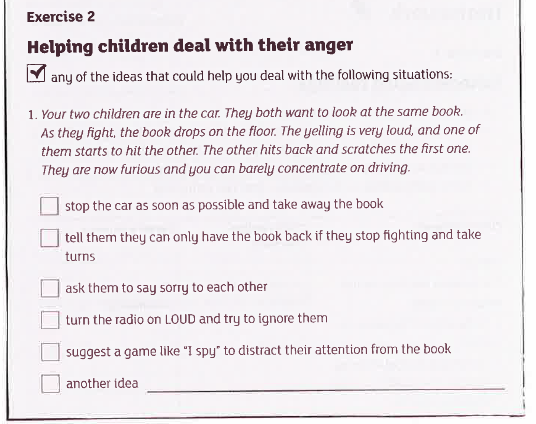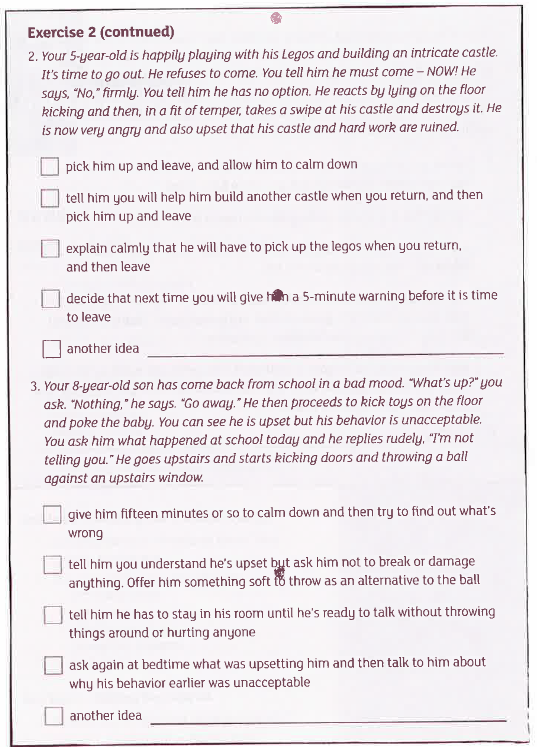Loading Content...
Share a Link to this Message
The link has been copied to your clipboard; paste it anywhere you would like to share it.
CloseParenting Children - August 17, 2012
Day 5 – Experiencing & Observing Healthy Relationships

Children learn to relate through experiencing, observing, and practicing various relationships within the family:
• parent-child
• mother-father
• sibling-sibling
• grandparent-grandchild
• uncles, aunts, cousins, etc.
Experiencing: parent-child relationship
• children learn to love through experiencing their parents. unconditional love
• important for children to feel accepted for who they are
Our love and acceptance give our children confidence through building in them:
• security (knowing they are loved not for what they do, but for who they are)
• self-worth (knowing they are of value - their self-worth is based on what they think we, their parents, think of them)
• significance (knowing there is a purpose to their lives, and that they have a worthwhile contribution to make)
Ultimately security, self-worth and Significance come from God
• we model God’s parenthood of us
• parents are in loco dei (in His place to represent Him)
Observing: mother-father (and other adult) relationships
• children learn to relate through observing adult relationships
• how we, their parents, speak and listen to each other
• the physical affection we show
• whether and how we resolve conflicts
• children need to see firsthand the modeling of an intimate, committed adult relationship
• if parenting together, consider doing The Marriage Course to invest in your relationship
• if not parenting together, work at having thebest possible relationship with your child’s other parent (resolving conflict, forgiveness, consistency, etc.)
Question:
Where is your child learning most about how to build healthy relationships?
Related Topics: Children, Family, Relationships | More Messages from Parenting Children | Download Audio
From Series: "Parenting Children Ages 0-10"
More From "Parenting Children Ages 0-10"
| About the Parenting Children Course | July 1, 2012 | Watch | Listen | ||
| Day 1 - Introduction | August 13, 2012 | Watch | Listen | ||
| Day 2 - Challenges | August 14, 2012 | Watch | Listen | ||
| Day 3 – Family Provides Support | August 15, 2012 | Watch | Listen | ||
| Day 4 – Family Provides Fun & A Moral Compass | August 16, 2012 | Watch | Listen | ||
| Day 5 – Experiencing & Observing Healthy Relationships | August 17, 2012 | Watch | Listen | ||
| Day 6 – Practicing Healthy Relationships (and Parenting Alone) | August 18, 2012 | Watch | Listen | ||
| Day 7 – Setting Goals and The Importance of Play | August 19, 2012 | Watch | Listen | ||
| Day 8 – Screentime | August 20, 2012 | Watch | Listen | ||
| Day 9 – The Importance of Bonding | August 21, 2012 | Watch | Listen | ||
| Day 10 – The Importance of Establishing Routines | August 22, 2012 | Watch | Listen | ||
| Day 11 – Bedtimes | Parenting Children | August 23, 2012 | Watch | Listen | |
| Day 12 – Introduction to the Love Languages | August 24, 2012 | Watch | Listen | ||
| Day 13 – Introduction to the Love Languages II | Parenting Children | August 25, 2012 | Watch | Listen | |
| Day 14 – Love Language – Affirming Words | Parenting Children | August 26, 2012 | Watch | Listen | |
| Day 15 – Love Language – Affectionate and Appropriate Touch | Parenting Children | August 27, 2012 | Watch | Listen | |
| Day 16 – Love Language – One to One Time | August 28, 2012 | Watch | Listen | ||
| Day 17 – Love Language – Thoughtful Presents | Parenting Children | August 29, 2012 | Watch | Listen | |
| Day 18 – Love Language – Kind Actions | Parenting Children | August 30, 2012 | Watch | Listen | |
| Day 19 – Summary of the Love Languages | Parenting Children | September 1, 2012 | Watch | Listen | |
| Day 20 - Combining Love and Limits - Why Boundaries Matter | Parenting Children | September 3, 2012 | Watch | Listen | |
| Day 21 - The Challenges of Setting Boundaries | Parenting Children | September 4, 2012 | Watch | Listen | |
| Day 22 - Where do we set boundaries | Parenting Children | September 5, 2012 | Watch | Listen | |
| Day 23 - Setting Boundaries Part I | Parenting Children | September 6, 2012 | Watch | Listen | |
| Day 24 - Setting Boundaries Part II | Parenting Children | September 7, 2012 | Watch | Listen | |
| Day 25 - Helping Children Make Good Choices Part I | Parenting Children | September 8, 2012 | Watch | Listen | |
| Day 26 - Helping Children Make Good Choices Part II | Parenting Children | September 9, 2012 | Watch | Listen | |
| Day 27 - Helping Children Make Good Choices Part III | Parenting Children | September 10, 2012 | Watch | Listen | |
| Day 28 - Helping Children Make Good Choices Part IV | Parenting Children | September 11, 2012 | Watch | Listen | |
| Day 29 - Modeling and Practicing Relationships - The Power of Listening | Parenting Children | September 12, 2012 | Watch | Listen | |
| Day 30 - The Power of Listening - Part I | Parenting Children | September 13, 2012 | Watch | Listen | |
| Day 31 - The Power of Listening - Part II | Parenting Children | September 14, 2012 | Watch | Listen | |
| Day 32 - Relationships with siblings and other children Part I | Parenting Children | September 15, 2012 | Watch | Listen | |
| Day 33 - Relationships with siblings and other children Part II | Parenting Children | September 16, 2012 | Watch | Listen | |
| Day 34 - Relationships with siblings and other children Part III | Parenting Children | September 17, 2012 | Watch | Listen | |
| Day 35 - Handling anger - Ours and theirs | Parenting Children | September 18, 2012 | Watch | Listen | |
| Day 36 - Helping our children manage their anger - Toddler tantrums | Parenting Children | September 19, 2012 | Watch | Listen | |
| Day 37 - Helping our children manage their anger - Older children Ages 5-10 | Parenting Children | September 20, 2012 | Watch | Listen | |
| Day 38 - Teaching our children to manage their anger | Parenting Children | September 21, 2012 | Watch | Listen | |
| Day 39 - Teaching our children to manage their anger Part II | Parenting Children | September 22, 2012 | Watch | Listen | |
| Day 40 - Encouraging Responsibility | Parenting Children | September 23, 2012 | Watch | Listen | |
| Day 41 - Symptoms of Unhealthy Control | Parenting Children | September 24, 2012 | Watch | Listen | |
| Day 42 - Good Choices - Sex | Parenting Children | September 25, 2012 | Watch | Listen | |
| Day 43 - Good Choices - The Internet, Games, Drugs and Alcohol | Parenting Children | September 26, 2012 | Watch | Listen | |
| Day 44 - Passing on Beliefs and Values - Answering Questions | Parenting Children | September 27, 2012 | Listen | ||
| Day 45 - Passing on Beliefs and Values At Home, With Others and On Money | Parenting Children | September 28, 2012 | Watch | Listen | |
| Day 46 - Praying for our children | Parenting Children | September 29, 2012 | Watch | Listen | |
| Day 47 - Developing family traditions, routines, and rituals | Parenting Children | September 30, 2012 | Watch | Listen | |
| Day 48 - Conclusion | Parenting Children | October 1, 2012 | Watch | Listen |
Powered by Series Engine

1. Recognize it’s a long process
- typically it takes at least eighteen years!
- help them to realize that talking through an issue that has upset them is more productive than behaving badly
2, Try to find the root cause of the anger
- listen to your child
- HALT – are they Hungry, Anxious, Lonely or Tired?
- may not be easy to work out root cause – they may not know
- if we don’t find the root cause, they can become angrier or suppress their emotions, leading to rebellion later
- create environment of openness and honesty to encourage communication

Complete the attached worksheet.


2164



